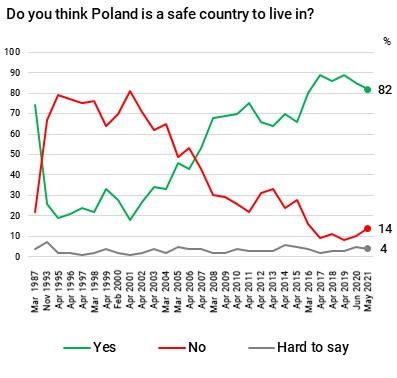19/2021
2021-06-22
How Safe Do Poles Feel?
A decided majority of the people surveyed consider Poland to be a safe country. However, after last year’s slight fall in positive opinions, this year has seen another small drop in the percentage of those who find Poland safe. This applies only to the country as a whole, with assessments of safety in people’s places of residence remaining stable. This slightly diminished feeling of safety on a national level is reflected in an increase in anxiety about crime, in particular anxiety about the threat to those the respondents hold dear. Since June last year, the number of people worried that they may become victims of crime has risen by five percentage points to 41%, and is the highest for five years. Correspondingly, the percentage of those who are unworried about this has dropped five points to 57%. Currently, in contrast to last year, over a half of Polish people are afraid that someone from their immediate family could become a victim of crime (53%, an increase of 8 points), while a smaller part (45%, a drop of 7 points) has no such worries. Interestingly, this rise in anxiety that they or their close family members may become victims of crime, is not corroborated by their actual experiences of the past year: none of the crimes people were asked about has become more widespread than in 2020.

|
More on this subject in the CBOS report.
This ‘Current Events and Problems’ survey (372) was conducted using a mixed-mode procedure on a representative sample of named adult residents of Poland, randomly selected from the National Identity Number (PESEL) register.
Respondents independently selected one of the following methods:
– Computer Assisted Personal Interview (CAPI);
– Computer Assisted Telephone Interview (CATI), respondents receiving researchers’ telephone numbers in an introductory letter from CBOS;
– Computer Assisted Web Interview (CAWI), where respondents filled in the online questionnaire independently, gaining access by means of a login and password provided in an introductory letter from CBOS.
– Computer Assisted Personal Interview (CAPI);
– Computer Assisted Telephone Interview (CATI), respondents receiving researchers’ telephone numbers in an introductory letter from CBOS;
– Computer Assisted Web Interview (CAWI), where respondents filled in the online questionnaire independently, gaining access by means of a login and password provided in an introductory letter from CBOS.
In all three cases the questionnaire had the same structure and comprised the same questions. The survey was carried out between 6 – 16 May 2021 inclusive on a sample of 1163 people (54.8% using the CAPI method, 30% CATI and 15.2% CAWI).
CBOS has been conducting statutory research using the above procedure since May 2020, stating in each case the percentage of personal, telephone and internet interviews.





